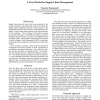21 search results - page 4 / 5 » Toward a general theory of quantum games |
DIMACS
1996
13 years 7 months ago
1996
in Structure'95. 14] R. Fagin. Easier ways to win logical games. In Proc. DIMACS Workshop on Descriptive Complexity and Finite Models, AMS 1997. 15] R. Fagin, L. Stockmeyer, M...
JETAI
2007
13 years 5 months ago
2007
Reasoning, problem solving, indeed the general process of acquiring knowledge, is not an isolated, homogenous affair involving a one agent using a single form of representation, b...
Publication
We introduce a class of learning problems where the agent is presented with a series of tasks. Intuitively, if there is relation among those tasks, then the information gained duri...
IUI
2004
ACM
13 years 11 months ago
2004
ACM
In this paper, we describe a new approach to the creation of virtual environments, which uses qualitative physics to implement object behaviour. We adopted Qualitative Process The...
AAAI
2010
13 years 4 months ago
2010
hey generalize these factors to the abstract concepts of ability, integrity, and benevolence. This model does not use probabilistic decision theory. Other SCM trust factors have be...

